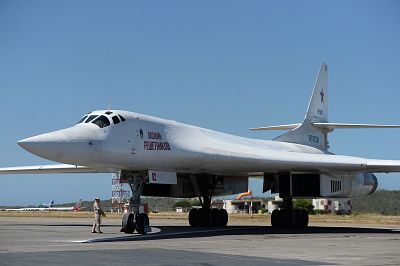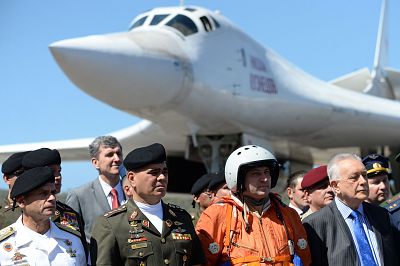angelburst29
The Living Force
November 6, 2018 - EU extends Venezuela Sanctions over democracy, rights violations
EU extends Venezuela sanctions over democracy, rights violations | Reuters

Venezuela's President Nicolas Maduro speaks during a meeting with ministers at Miraflores Palace in Caracas, Venezuela November 2, 2018. Miraflores Palace/Handout via REUTERS
The European Union on Tuesday extended sanctions against Venezuela until November 2019 for what it said were human rights violations and undermining of democracy and the rule of law under President Nicolas Maduro.
The bloc has an embargo against Venezuela on the sales of arms and “equipment for internal repression”, a travel ban and an asset freeze on 18 Venezuelan officials in place.
This is in response to accusations of rights abuses by state security officials during anti-government protests in January, and a May presidential election that gave Maduro a second term but was widely dismissed as a sham.
The deep political, social and economic crisis in the oil-rich South American country has driven more than two million Venezuelans abroad, according to the United Nations.
Maduro accuses the United States, which also has slapped sanctions on his officials, of running an international conspiracy against him.
November 5, 2018 - Venezuela adds Troops near Colombian Border after Three Soldiers killed
Venezuela adds troops near Colombian border after three soldiers killed | Reuters
Venezuela has reinforced its border with Colombia with more troops after three Venezuelan soldiers died in an attack by an armed group over the weekend, Defense Minister Vladimir Padrino said on Monday.
Ten other soldiers were injured in the attack in Amazonas state, which Padrino said was retribution for Venezuela’s capture of “nine Colombian paramilitary members,” the latest sign of worsening relations between the South American neighbors.
“We will find the paramilitaries wherever they are,” Padrino said in a statement on state television. “For now, I say to them: leave Venezuela. There is no space here. There has never been any space here for you.”
He did not specify how many more troops had been sent to the border. The injured soldiers were not in critical condition, Padrino said.
Incidents involving Venezuelan soldiers along the porous, 2,200-km (1,367-mile) border are fairly common, and have contributed to diplomatic tensions between the two countries.
In September, Colombia sent a letter of protest to Caracas after Venezuelan soldiers crossed into its territory and detained three Colombian citizens.
Colombia has been a leading critic of Venezuela’s socialist President Nicolas Maduro. The OPEC country has been suffering through an economic collapse since Maduro took office in 2013 and Colombia has been the main haven for Venezuelans fleeing severe food and medicine shortages.
In a statement on Monday, Venezuelan opposition party Popular Will attributed the attack to the National Liberation Army (ELN), a Colombian rebel group. The opposition has long accused Maduro of turning a blind eye to the presence of violent Colombian groups operating in Venezuelan territory.
Colombia’s foreign ministry said in a statement later on Monday that one of the nine people captured by Venezuela was Luis Ortega, a Colombian citizen and ELN leader with an Interpol blue notice for alleged crimes committed in Colombia.
A blue notice is used to ask other jurisdictions to cooperate in determining an individual’s identity, location or activities related to a crime, according to Interpol.
EU extends Venezuela sanctions over democracy, rights violations | Reuters
Venezuela's President Nicolas Maduro speaks during a meeting with ministers at Miraflores Palace in Caracas, Venezuela November 2, 2018. Miraflores Palace/Handout via REUTERS
The European Union on Tuesday extended sanctions against Venezuela until November 2019 for what it said were human rights violations and undermining of democracy and the rule of law under President Nicolas Maduro.
The bloc has an embargo against Venezuela on the sales of arms and “equipment for internal repression”, a travel ban and an asset freeze on 18 Venezuelan officials in place.
This is in response to accusations of rights abuses by state security officials during anti-government protests in January, and a May presidential election that gave Maduro a second term but was widely dismissed as a sham.
The deep political, social and economic crisis in the oil-rich South American country has driven more than two million Venezuelans abroad, according to the United Nations.
Maduro accuses the United States, which also has slapped sanctions on his officials, of running an international conspiracy against him.
November 5, 2018 - Venezuela adds Troops near Colombian Border after Three Soldiers killed
Venezuela adds troops near Colombian border after three soldiers killed | Reuters
Venezuela has reinforced its border with Colombia with more troops after three Venezuelan soldiers died in an attack by an armed group over the weekend, Defense Minister Vladimir Padrino said on Monday.
Ten other soldiers were injured in the attack in Amazonas state, which Padrino said was retribution for Venezuela’s capture of “nine Colombian paramilitary members,” the latest sign of worsening relations between the South American neighbors.
“We will find the paramilitaries wherever they are,” Padrino said in a statement on state television. “For now, I say to them: leave Venezuela. There is no space here. There has never been any space here for you.”
He did not specify how many more troops had been sent to the border. The injured soldiers were not in critical condition, Padrino said.
Incidents involving Venezuelan soldiers along the porous, 2,200-km (1,367-mile) border are fairly common, and have contributed to diplomatic tensions between the two countries.
In September, Colombia sent a letter of protest to Caracas after Venezuelan soldiers crossed into its territory and detained three Colombian citizens.
Colombia has been a leading critic of Venezuela’s socialist President Nicolas Maduro. The OPEC country has been suffering through an economic collapse since Maduro took office in 2013 and Colombia has been the main haven for Venezuelans fleeing severe food and medicine shortages.
In a statement on Monday, Venezuelan opposition party Popular Will attributed the attack to the National Liberation Army (ELN), a Colombian rebel group. The opposition has long accused Maduro of turning a blind eye to the presence of violent Colombian groups operating in Venezuelan territory.
Colombia’s foreign ministry said in a statement later on Monday that one of the nine people captured by Venezuela was Luis Ortega, a Colombian citizen and ELN leader with an Interpol blue notice for alleged crimes committed in Colombia.
A blue notice is used to ask other jurisdictions to cooperate in determining an individual’s identity, location or activities related to a crime, according to Interpol.




